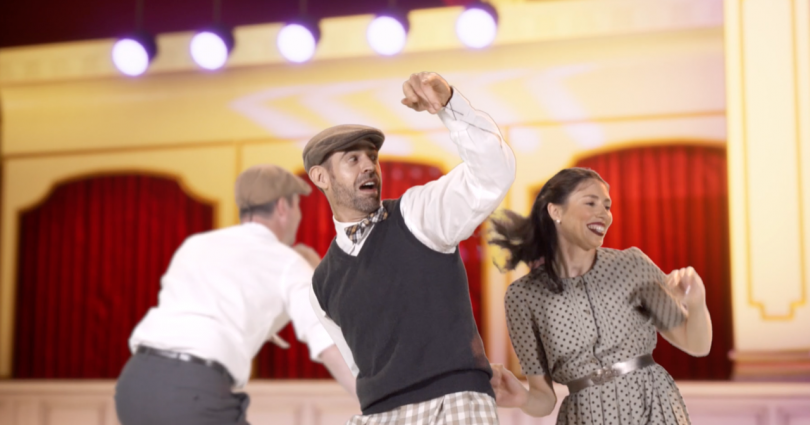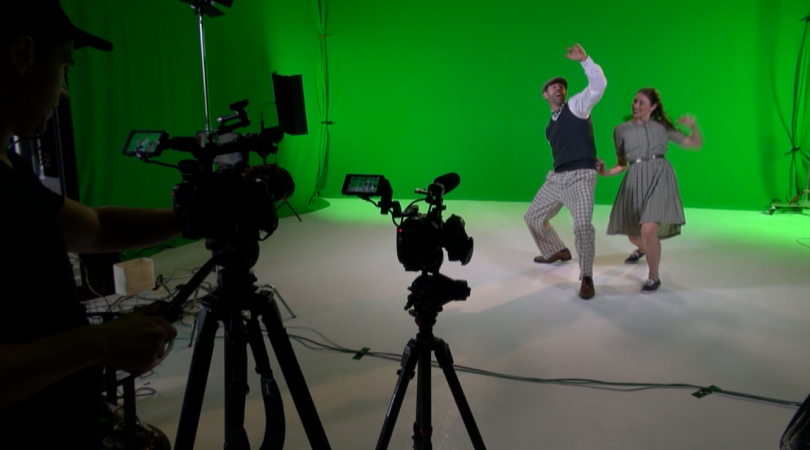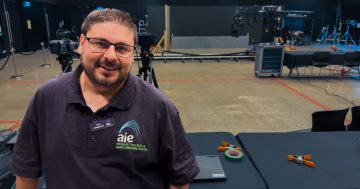
Ché Baker in a scene from his short film, VR Grampa. Photo: Supplied.
By embracing some of the latest technology in video production, a Canberra filmmaker has become a finalist in a national competition.
Ché Baker, filmmaker and director at Full Point Films, brought his future-self to life in VR Grampa for the Unreal Engine Short Film Challenge Australia.
More than 1800 participants joined the film challenge before 16 of the top pitches were selected to produce a short film using Unreal Engine, a real-time 3D creation tool that has evolved beyond its original use in video game production into being embraced by the film industry.
Ché, who admits he was “pretty lucky” to make the list of finalists, says virtual content production technology is the future of film production.
“It was a steep learning curve, but it was really exciting to see the potential,” he says.

Ché Baker performs for a scene in his short film, VR Grampa. Photo: Supplied.
“The last time there was this [much of a] big shift [in the film industry] was when we went from analogue to digital. I feel that seismic shift again – you have to really get on to it or get left behind.”
Ché says the technology will greatly enhance the Canberra film industry’s ability to create films that look much bigger in scope – for example, fantasy environments that do not exist – and also mean film crews will not need to do as much travel.
“When you can’t travel because of things such as COVID-19, this technology allows you to be anywhere, all in one place,” he says. “You can spend six hours shooting a sunrise, or resize a mountain in the background, all in real time. The potential is amazing.”
Using the technology means a film can be produced for a tenth of the cost of one that has to be shot on location, says Ché.
The story of VR Grampa follows ‘Gramps’, who longs to escape his nursing home and reunite with his departed wife. When his granddaughter brings him a VR [virtual reality] headset, Gramps dives into some ‘Unreal’ adventures.
Given the body of his younger self, Gramps has a score to settle, chasing the Grim Reaper through a multitude of worlds and virtual environments.

Ché Baker as ‘Gramps’ in a scene from VR Grampa. Photo: Supplied.
To create the film, Ché joined up with Josh Mulrine from Canberra’s Digital Content Studios and they used a range of virtual production techniques to bring Gramps to life.
“Besides using a giant LED wall for simulated travelling shots with the DeLorean, we used green screen and VIVE Tracker technology to marry the real cameras and virtual cameras together in real time,” he says.
“We also had some motion capture technology provided by local YouTuber ‘Markom3D’ so I could animate 3D virtual characters as they fight the live action version of Gramps.”
Artificial intelligence was also used to age Ché so he could play the older version of Gramps.
“I’m always interested to push available technology so I literally used an off-the-shelf iPhone app which was designed for taking selfies to add a few years to my face,” he says.
Ché, who has been in the film industry for 20 years and worked on major projects such as The Hobbit and Dawson’s Creek, says he hopes to grow the Canberra film industry to help make it sustainable.
In 2015, he directed feature film Blue World Order in Canberra and says he would like to replicate that model to produce more films in the capital.
With that goal in mind, Ché will use Unreal Engine in his new project called States of Mind, with filming to commence in June.
“It’s about a meditation retreat in a haunted house,” he says. “What could go wrong?
“We’ll be locally sourcing extras, financing and crew, as always, and aiming to help build the local industry.”
The Unreal Engine Short Film Challenge Australia initiative was supported by Epic Games and Screen Canberra. Also making the final is Canberra’s By George Studios with its film, The Girl on the Moon.
Josh says Digital Content Studios will transform its traditional studio space to lead the innovation of virtual studio productions.
“The DCS Backlot Studio is now available for local Canberra film productions and virtual productions,” he says.
To watch VR Grampa, click here, and to watch the competition’s other finalists, click here.














